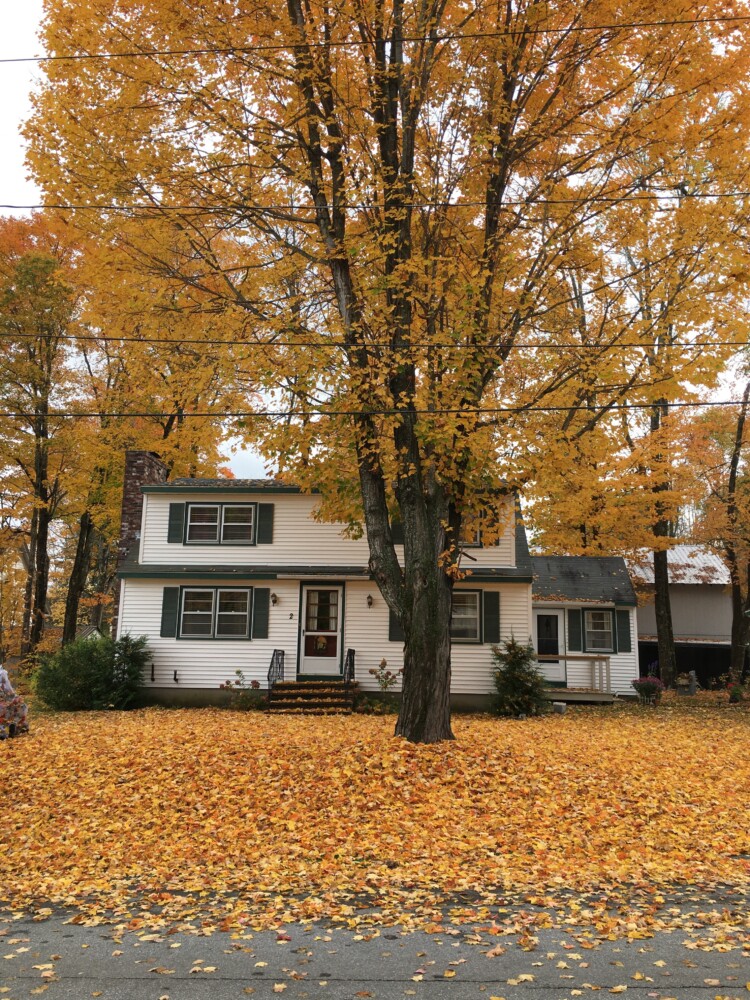Short, pithy statements aren’t always wrong. They do, however, lack context.
As Maine’s leaf season approached and is now in its beginning stages, I’ve seen and heard the phrase “Leave the leaves” multiple times. It’s been online, on television and in the pages of this newspaper.
I would suggest leaving some of the leaves, although that is not quite as catchy.
In addition to reducing the amount of work you need to do, by leaving the leaves be, they provide habitat for wildlife and improve the soil.
Among the wildlife the leaf litter assists are butterflies, some bees, turtles, chipmunks and earthworms. Those are mostly good, though I wonder – considering the damage chipmunks did this year to our tomatoes, squash and even decorative sedums – if I want to give them much help. My wife, Nancy, used deer repellent to keep the chipmunks away from the sedums on our patio. Earthworms are not native, and the newly arrived Amynthas jumping worms actually degrade the soil.
While the leaves provide homes for beneficial insects, they also provide home for things you might not want, such as roaches and termites. They encourage the growth of fungi, which can then spread to the ornamental plants in your garden. In addition, if leaves are allowed to pile up on a lawn, they will smother the grass, killing it. Yes, I know, large expanses of lawn are discouraged in environmentally friendly yards. Many people, however, prefer a little bit of lawn, if only to serve as a play area or a pathway to the more decorative parts of the garden.
Finally, aesthetics matter. Looking out the window during our increasingly snowless winters, I do not want to look at leaves blowing around and piled up against the fences and evergreen shrubs in our yard. The oak leaves, which dominate here, are a drab brown and take at least two years to decompose. We don’t like looking at them.
I propose a compromise. Yes, we rake, but we rake less than half of our property. We do not rake the section that is mostly oaks, red maples, black cherries, brambles, Solomon’s seal and other natives. Nor do we rake the vegetable garden, including the raspberry and strawberry beds.
The area we rake includes our small lawn, our heavily planted ornamental gardens and, somewhat oddly, our back patio, which sits under the clothesline Nancy uses most of the year. The prevailing winds each year create piles of leaves about a foot deep all over the patio, and they are easy to remove.
And, yes, I mean rake. I am among the people who believe leaf blowers should be banned. They are too loud and emit too many toxic fumes, which contribute to climate change.

Many lawn mowers will grind up the fall leaves into a mulch, which decomposes more quickly than whole leaves will. Bild-Wasser/Shutterstock
If possible, keep the leaves on your own property. I’ve written before about how I run ours through a leaf mulcher, store them for a winter (in compost bins) and spread them on the vegetable garden the following season. Running leaves through the mulcher isn’t required. It just speeds up decomposition. You can just pile the leaves up in a corner of your yard, where they will rot over time. Even the “Leave the Leaves”–promoting nonprofit Wild Seed Project accepts this, although not enthusiastically: “Shredding leaves does destroy the small creatures, but is a somewhat fair compromise for situations where a more tidy look is demanded by a homeowner,” it notes on its website.
Some neighbors might welcome leaves. When I interviewed jeweler and iris-breeder Dean Cole, he said landscapers dumped truckloads of leaves at his garden each year. There might be people near you who want them. As a last resort, ship them off to a municipal composting site.
For us who fall on the side of doing at least some raking, there is one other debate. Do you rake regularly as the leaves fall, keeping the yard clean all through the season? Or do you wait until the last leaf has fallen, and do the mammoth task all at once? Again, I fall in the middle. Through mid- to late October, I use our electric mower with a grass catcher to get the leaves. Then we’ll rake huge tarps full of leaves but, for now, skip the areas with only a few leaves.
The final, meticulous raking comes at the end of fall, which sometimes interferes with Thanksgiving weekend, and sometimes gets left uncompleted for a while because snowstorms have covered the leaves. There’s a downside to every compromise.
Tom Atwell is a freelance writer gardening in Cape Elizabeth. He can be contacted at: tomatwell@me.com.
Send questions/comments to the editors.



Success. Please wait for the page to reload. If the page does not reload within 5 seconds, please refresh the page.
Enter your email and password to access comments.
Hi, to comment on stories you must . This profile is in addition to your subscription and website login.
Already have a commenting profile? .
Invalid username/password.
Please check your email to confirm and complete your registration.
Only subscribers are eligible to post comments. Please subscribe or login first for digital access. Here’s why.
Use the form below to reset your password. When you've submitted your account email, we will send an email with a reset code.